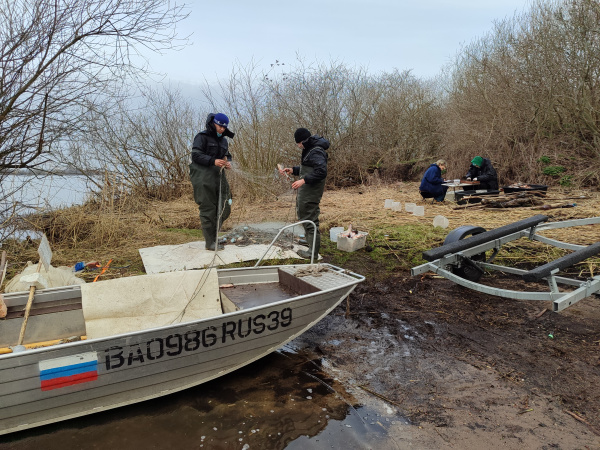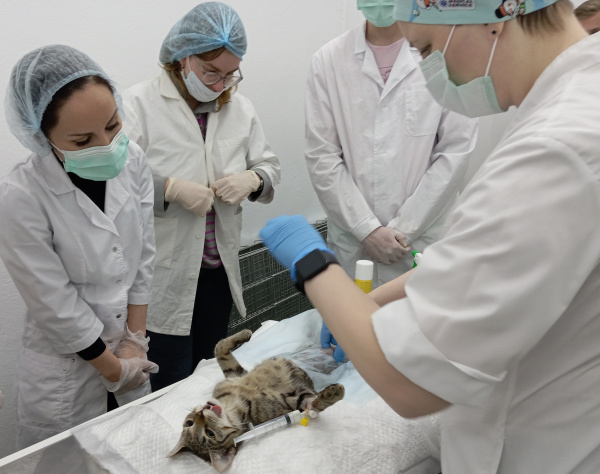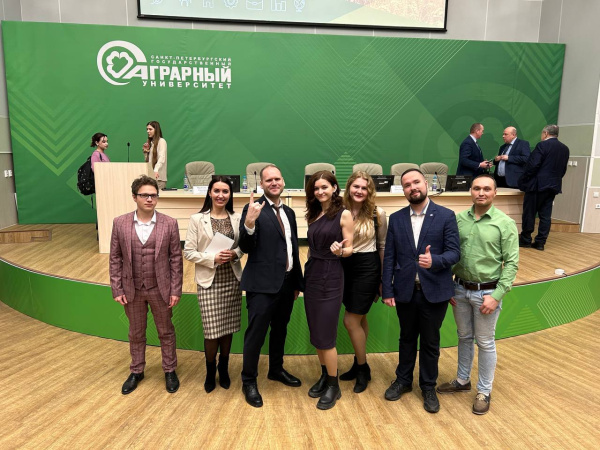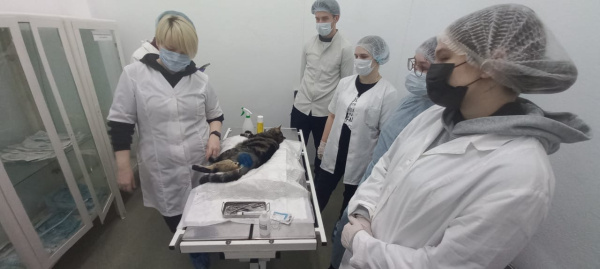KSTU scientists develop import-substituting technologies
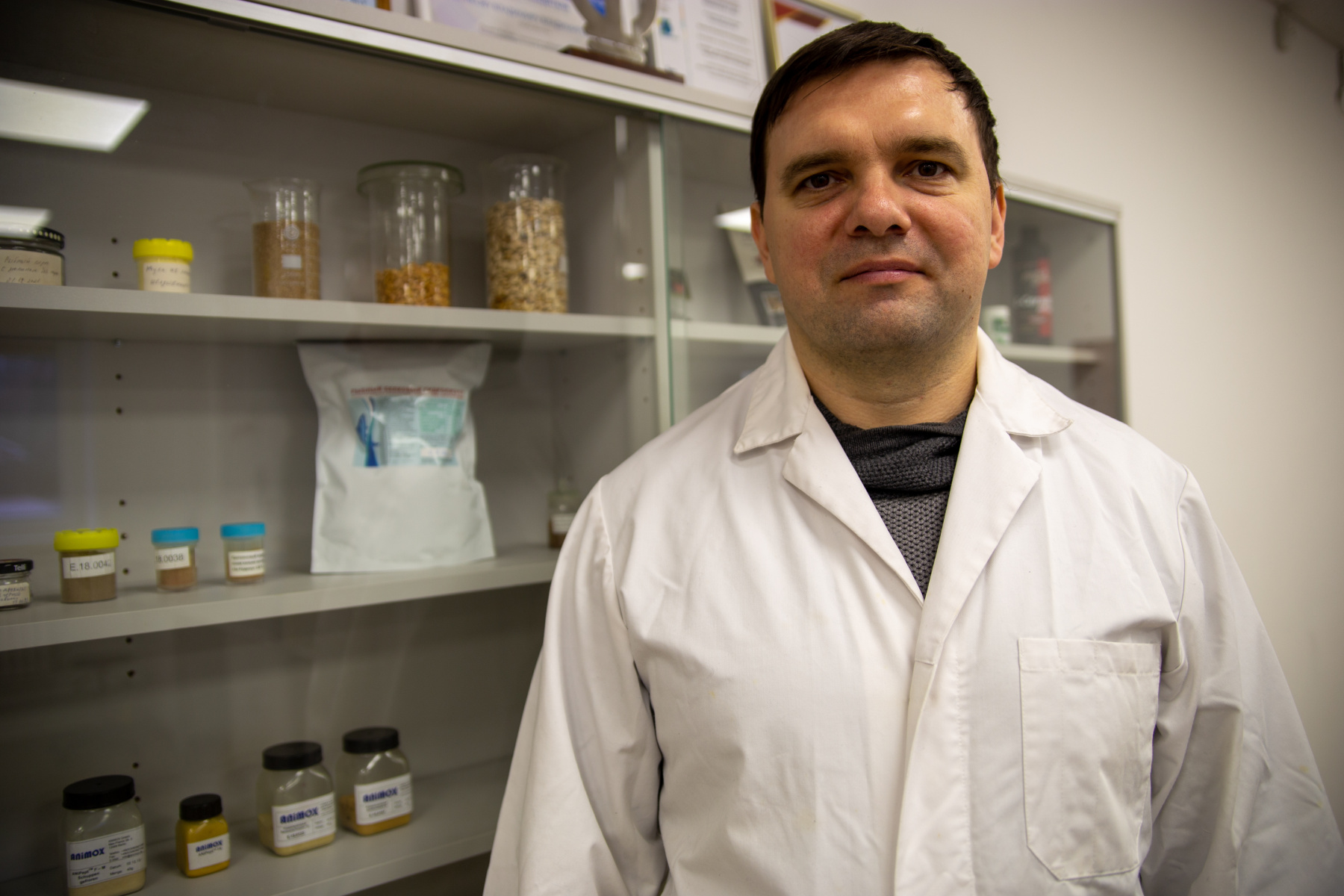
On the eve of the Day of Russian Science, we met with V.V. Volkov, Head of the Centre for Advanced Protein Utilization Technologies, the Department of Food Biotechnology at KSTU, and talked about the results of the work of the structure headed by him, everyday life and prospects.
- Vladimir Vladimirovich, tell our readers what scientific research was conducted by the Centre for Advanced Protein Utilization Technologies in 2023.
- Last year's research programme was very intense, with many practical experiments, trips and joint projects with research scientists from other scientific organisations and professional universities of the Federal Agency for Fishery (Rosrybolovstvo).
On the basis of the centre, scientific and research work was successfully carried out within the state task for 2023 on the project Obtaining Biologically Active Substances from By-Products and Underused Aquatic Biological Resources for Fish Farming and Technical Purposes.
Under the guidance of the Doctor of Engineering Sciences, Professor O.Y. Mezenova, Head of the Department of Food Biotechnology, the research was conducted on the topic Integrated Processing of Chitin-Containing Aquatic Biological Resources to Improve Aquabiotechnology and Microbial Synthesis of Biopolymers.
Also, on our base, together with our colleagues from Vladivostok, the Far Eastern State Technical Fisheries University (FESTFU), a number of unique experiments on the use of secondary raw materials of caviar production for obtaining biologically valuable protein products were carried out. In the course of the research, new equipment for ultrasonic processing of secondary raw materials was launched and tested.
These studies allowed us to develop new types of domestic aquaculture feed that are not inferior and sometimes surpass in various parameters foreign samples previously supplied to our market. In addition, we developed technologies for obtaining protein products, which, in the future, can replace foreign analogues. So, we are making our own contribution to import substitution programme in Russia.
- Vladimir Vladimirovich, does your centre have any promising projects for several years?
- Yes, today we are working on a joint project until 2026. It is implemented within the framework of the interdisciplinary grant of the Russian Science Foundation № 23-64-10007 for 2023-2026 as a co-executor with the Institute of Biophysics of the Siberian Branch of the Russian Academy of Sciences in Krasnoyarsk. According to the project plan, our centre has carried out part of the research work on optimising fat extraction from secondary fish raw materials. In addition, we have successfully experimented with the enzymatic hydrolysis of plant raw materials for food purposes and aquaculture feeds with domestic enzyme preparations.
In 2024, a large scientific work will continue under the RNF grant № 23-64-10007 of the project entitled Biotechnological Synthesis of Protein from Single-Celled and Degradable Bioplastics Using Fat-Containing Waste from Fish Processing Technologies as a New Carbon Substrate: Fundamental Justification and Implementation with colleagues from Krasnoyarsk Institute of Biophysics (IBP) SB RAS, and this year it is devoted to the topic Extraction of Fat from Secondary Fish Raw Materials by Enzymatic and Combined Method.
Also, this year, work continues on the project Integrated Processing of Underused Biological Resources to Improve Aquabiotechnology under the theme Obtaining Biologically Active Substances from By-Products and Underused Aquatic Biological Resources for Fish Farming and Technical Purposes, which will allow testing alternative sources of protein in aquaculture feed.
In addition, useful applied research activities will continue with fish processing enterprises in the Kaliningrad region and other regions of Russia.
In 2023, the first industrial implementation of the technology of thermal hydrolysis of fish meal manufacturing waste with the production of fish feed hydrolysate, developed by us, took place in the Kemerovo region.
We can already see the prospects for new implementations of our joint developments.
- Tell us, how do you manage to improve the material and technical base of the centre in the current difficult conditions?
- Just a couple of months ago, we assembled a unique ultrafiltration unit for the separation of materials by molecular weight and concentration of protein substances. The centre's specialists assembled the main elements of a pilot hydrolysis line in order to obtain samples of hydrolysis products in kilogram quantities for feed testing and production of pilot batches of products according to the technological parameters optimised on the laboratory hydrolysis line.
In 2023, we purchased new equipment: a Velp fat extractor, two ultrasonic baths, an oil press, an ultrafiltration module and a pump, for a total of about 2 million roubles.
We continue to modernise the existing equipment and try to maintain a decent level of the facilities. It allows us to conduct complex scientific research.
- Grants are now an effective form of research funding. Could you share your experience in this direction?
- As I mentioned above, together with our colleagues from Krasnoyarsk, we managed to win the grant of the Russian Science Foundation № 23-64-10007 and provide ourselves with work in this area until 2026. This grant was won only on the third attempt; the first joint application was prepared in 2021.
We are not standing still and have already prepared another application for the competition of projects to the Russian Science Foundation, which today really finances scientific teams and helps in the implementation of advanced ideas.
- For research scientists, is it only the result that matters, or is it also the recognition in the scientific community, and even more so on international platforms?
- Availability of publications in Russian scientific and foreign editions stimulates our activity and shows the scientific world what results we have achieved, despite sanctions and other restrictions from our partners abroad.
In 2023, three international publications indexed in the international databases Web of Science and SCOPUS were made; four articles were published in the publications of the Higher Attestation Commission of the Ministry of Education and Science of Russia; and a patent of the Russian Federation was obtained for one of the developments made with the participation of the Centre for Advanced Protein Utilization Technologies personnel.
One of the articles prepared jointly with Krasnoyarsk colleagues was published in the prestigious journal International Journal of Molecular Sciences, which is included in the first quartile of international databases Web of Science and SCOPUS: N.O. Zhila, E.G. Kiselev, V.V. Volkov, O.Ya. Mezenova, K.Yu. Sapozhnikova, E.I. Shishatskaya, and T.G. Volova. Properties of degradable polyhydroxyalkanoates synthesized from new waste fish oils (WFO) // Int. J. Mol. Sci. 2023-Vol. 24(16) (IF WoS 5.6, Q1; CiteScore (Scopus) 7.8, Q1).
- Vladimir Vladimirovich, would you tell us what you do to maintain the center’s staff of specialists?
- Keeping necessary specialists in our, so to speak, team is conditioned by the understanding and flexible personnel policy of KSTU management. Thanks to this mutual understanding, we managed to keep the necessary specialists in the team. All of them, from a simple laboratory assistant to a scientist, are fully involved in the process of research work for several years ahead.
The сentre's participation in grant projects also has a positive impact on the quality of work of the specialists involved in research. Thanks to the joint grant with our colleagues from Siberia, we have an opportunity to keep people in the team, do scientific work that is interesting and useful for the perspective and be confident in the future.
- Vladimir Vladimirovich, tell our readers what scientific research was conducted by the Centre for Advanced Protein Utilization Technologies in 2023.
- Last year's research programme was very intense, with many practical experiments, trips and joint projects with research scientists from other scientific organisations and professional universities of the Federal Agency for Fishery (Rosrybolovstvo).
On the basis of the centre, scientific and research work was successfully carried out within the state task for 2023 on the project Obtaining Biologically Active Substances from By-Products and Underused Aquatic Biological Resources for Fish Farming and Technical Purposes.
Under the guidance of the Doctor of Engineering Sciences, Professor O.Y. Mezenova, Head of the Department of Food Biotechnology, the research was conducted on the topic Integrated Processing of Chitin-Containing Aquatic Biological Resources to Improve Aquabiotechnology and Microbial Synthesis of Biopolymers.
Also, on our base, together with our colleagues from Vladivostok, the Far Eastern State Technical Fisheries University (FESTFU), a number of unique experiments on the use of secondary raw materials of caviar production for obtaining biologically valuable protein products were carried out. In the course of the research, new equipment for ultrasonic processing of secondary raw materials was launched and tested.
These studies allowed us to develop new types of domestic aquaculture feed that are not inferior and sometimes surpass in various parameters foreign samples previously supplied to our market. In addition, we developed technologies for obtaining protein products, which, in the future, can replace foreign analogues. So, we are making our own contribution to import substitution programme in Russia.
- Vladimir Vladimirovich, does your centre have any promising projects for several years?
- Yes, today we are working on a joint project until 2026. It is implemented within the framework of the interdisciplinary grant of the Russian Science Foundation № 23-64-10007 for 2023-2026 as a co-executor with the Institute of Biophysics of the Siberian Branch of the Russian Academy of Sciences in Krasnoyarsk. According to the project plan, our centre has carried out part of the research work on optimising fat extraction from secondary fish raw materials. In addition, we have successfully experimented with the enzymatic hydrolysis of plant raw materials for food purposes and aquaculture feeds with domestic enzyme preparations.
In 2024, a large scientific work will continue under the RNF grant № 23-64-10007 of the project entitled Biotechnological Synthesis of Protein from Single-Celled and Degradable Bioplastics Using Fat-Containing Waste from Fish Processing Technologies as a New Carbon Substrate: Fundamental Justification and Implementation with colleagues from Krasnoyarsk Institute of Biophysics (IBP) SB RAS, and this year it is devoted to the topic Extraction of Fat from Secondary Fish Raw Materials by Enzymatic and Combined Method.
Also, this year, work continues on the project Integrated Processing of Underused Biological Resources to Improve Aquabiotechnology under the theme Obtaining Biologically Active Substances from By-Products and Underused Aquatic Biological Resources for Fish Farming and Technical Purposes, which will allow testing alternative sources of protein in aquaculture feed.
In addition, useful applied research activities will continue with fish processing enterprises in the Kaliningrad region and other regions of Russia.
In 2023, the first industrial implementation of the technology of thermal hydrolysis of fish meal manufacturing waste with the production of fish feed hydrolysate, developed by us, took place in the Kemerovo region.
We can already see the prospects for new implementations of our joint developments.
- Tell us, how do you manage to improve the material and technical base of the centre in the current difficult conditions?
- Just a couple of months ago, we assembled a unique ultrafiltration unit for the separation of materials by molecular weight and concentration of protein substances. The centre's specialists assembled the main elements of a pilot hydrolysis line in order to obtain samples of hydrolysis products in kilogram quantities for feed testing and production of pilot batches of products according to the technological parameters optimised on the laboratory hydrolysis line.
In 2023, we purchased new equipment: a Velp fat extractor, two ultrasonic baths, an oil press, an ultrafiltration module and a pump, for a total of about 2 million roubles.
We continue to modernise the existing equipment and try to maintain a decent level of the facilities. It allows us to conduct complex scientific research.
- Grants are now an effective form of research funding. Could you share your experience in this direction?
- As I mentioned above, together with our colleagues from Krasnoyarsk, we managed to win the grant of the Russian Science Foundation № 23-64-10007 and provide ourselves with work in this area until 2026. This grant was won only on the third attempt; the first joint application was prepared in 2021.
We are not standing still and have already prepared another application for the competition of projects to the Russian Science Foundation, which today really finances scientific teams and helps in the implementation of advanced ideas.
- For research scientists, is it only the result that matters, or is it also the recognition in the scientific community, and even more so on international platforms?
- Availability of publications in Russian scientific and foreign editions stimulates our activity and shows the scientific world what results we have achieved, despite sanctions and other restrictions from our partners abroad.
In 2023, three international publications indexed in the international databases Web of Science and SCOPUS were made; four articles were published in the publications of the Higher Attestation Commission of the Ministry of Education and Science of Russia; and a patent of the Russian Federation was obtained for one of the developments made with the participation of the Centre for Advanced Protein Utilization Technologies personnel.
One of the articles prepared jointly with Krasnoyarsk colleagues was published in the prestigious journal International Journal of Molecular Sciences, which is included in the first quartile of international databases Web of Science and SCOPUS: N.O. Zhila, E.G. Kiselev, V.V. Volkov, O.Ya. Mezenova, K.Yu. Sapozhnikova, E.I. Shishatskaya, and T.G. Volova. Properties of degradable polyhydroxyalkanoates synthesized from new waste fish oils (WFO) // Int. J. Mol. Sci. 2023-Vol. 24(16) (IF WoS 5.6, Q1; CiteScore (Scopus) 7.8, Q1).
- Vladimir Vladimirovich, would you tell us what you do to maintain the center’s staff of specialists?
- Keeping necessary specialists in our, so to speak, team is conditioned by the understanding and flexible personnel policy of KSTU management. Thanks to this mutual understanding, we managed to keep the necessary specialists in the team. All of them, from a simple laboratory assistant to a scientist, are fully involved in the process of research work for several years ahead.
The сentre's participation in grant projects also has a positive impact on the quality of work of the specialists involved in research. Thanks to the joint grant with our colleagues from Siberia, we have an opportunity to keep people in the team, do scientific work that is interesting and useful for the perspective and be confident in the future.

